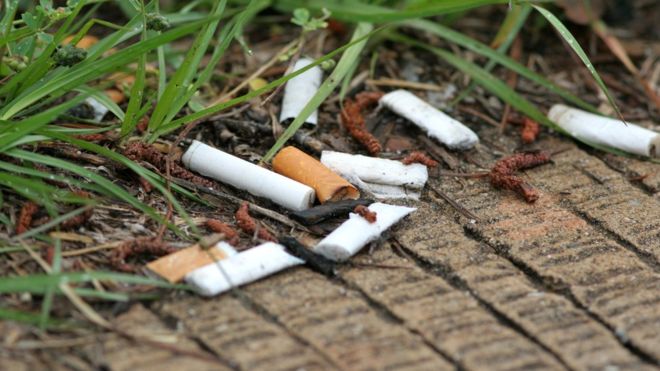Published by the BBC News
Discarded cigarette butts can hamper plant growth, new research suggests.
The study, led by Anglia Ruskin University, found the presence of butts in soil reduced the germination success and shoot length of clover by 27% and 28% respectively.
For grass, germination success reduced by 10% and shoot length by 13%.
An estimated 4.5 trillion butts are littered globally each year making them the planet’s most pervasive form of plastic pollution, the study said.
Most cigarette butts contain a filter made of cellulose acetate fibre, a type of a bioplastic.
But researchers found filters from un-smoked cigarettes had almost the same effect on plant growth as used filters, indicating that the damage to plants is caused by the filter itself, even without the additional toxins released from the burning of the tobacco.
As part of the research – published in the journal Ecotoxicology and Environmental Safety – academics sampled locations around the city of Cambridge and found areas with as many as 128 discarded cigarette butts per sq metre.
Control experiments were carried out and contained pieces of wood of identical shape and size as the cigarette butts.
‘Decades to break down’
Lead author Dr Dannielle Green said while dropping butts seemed to be “socially acceptable”, they had the ability to “cause serious damage to the environment”.
Dr Green – a senior biology lecturer at ARU – said: “Despite being a common sight littering streets and parks worldwide, our study is the first to show the impact of cigarette butts on plants.
“We found they had a detrimental effect on the germination success and shoot length of both grass and clover, and reduced the root weight of clover by over half.
“Ryegrass and white clover, the two species we tested, are important forage crops for livestock as well as being commonly found in urban green spaces.
“These plants support a wealth of biodiversity, even in city parks, and white clover is ecologically important for pollinators and nitrogen fixation.”
She said that the filters can take years, if not decades, to break down.
Co-author Dr Bas Boots added: “Although further work is needed, we believe it is the chemical composition of the filter that is causing the damage to plants.
“Most are made from cellulose acetate fibres, and added chemicals which make the plastic more flexible, called plasticisers, may also be leaching out and adversely affecting the early stages of plant development.”
What does the law say?
Fines for littering – including that of cigarette butts – are set by local authorities, rather than central government.
However, the Depart for Environment, Food and Rural Affairs states that penalty notices for littering must range between £65 and £150, with the default fine being £100.
The City of London – one of the authorities that sets its fines at £150 – says six million butts are littered on its streets each year, adding it spends £3.8m cleaning them up.
In a bid to reduce the number of butts discarded on its streets, the City of London has installed 700 “butt bins” on walls and street lamps. It also offers free pocket ashtrays.
Despite littering being a criminal offence, research by environmental charity Keep Britain Tidy suggests more than 10% of smokers do not consider dropping their butts to be littering.
Allison Ogden-Newton, the charity’s chief executive, said: “These butts are toxic and plastic and cause significant damage when they get into our aquatic and marine environments. Now we know they are having an impact on our plant life too.
“It is time for smokers to take responsibility and bin their butts – not pollute our planet with them.”



